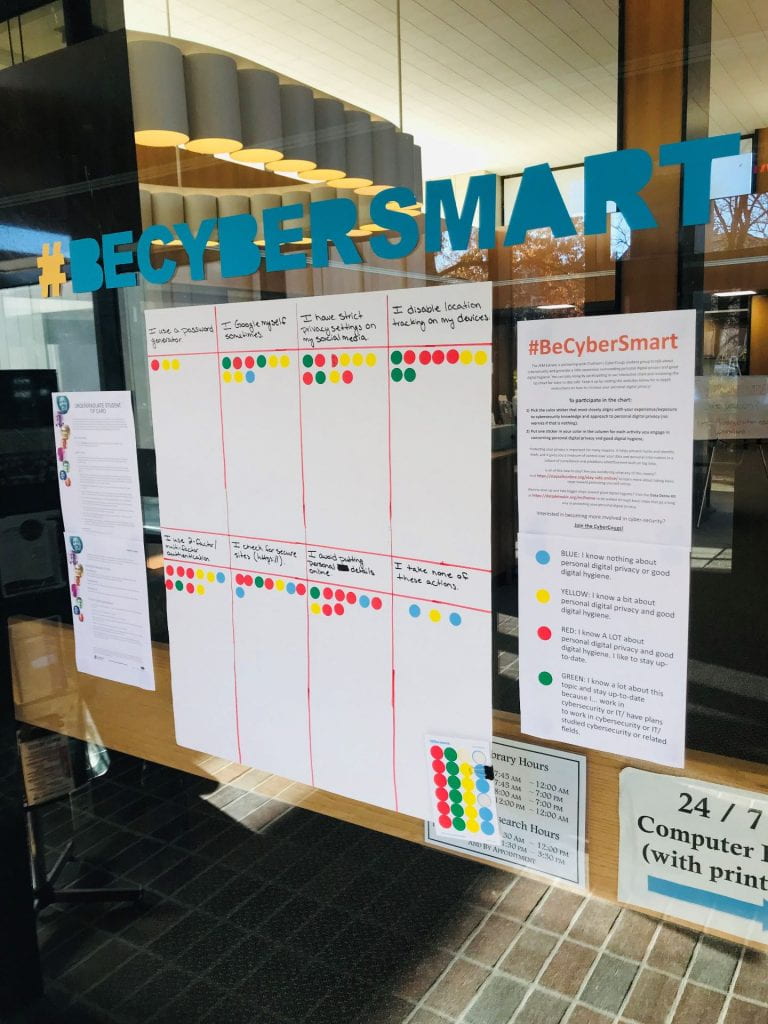As we live more and more of our lives on the Internet, it’s important to take personal digital privacy seriously. Hacking techniques can be very sophisticated, and a breech in your privacy can have devastating effects. Learning how to protect your data and your privacy online, as well as how to develop good digital hygiene, is becoming more and more important.
Last semester (fall 2019), we conducted an informal #BeCyberSmart survey of our patrons, asking which level of familiarity they have with personal digital privacy and which actions they take to protect their personal information online.
Patrons were asked to select a sticker color that corresponded with their knowledge level and place those stickers in the columns representing actions they have taken to protect their personal digital privacy. Below are the results of this interactive informal survey.
While most participants have indicated that they know at least a little bit about personal digital privacy and cybersecurity, there is always room for more knowledge! The more you know, the better able you are to protect yourself online. Below we’ve compiled a quick list of resources for you to use when going about a personal digital detox or increasing your personal digital privacy.
1) Use a password manager like Bitwarden or LastPass.
2) Go through the Data Detox Kit: https://datadetoxkit.org/en/home
- From the website… “The Data Detox Kit’s clear suggestions and concrete steps help people harness all aspects of their online lives, making more informed choices and changing their digital habits in ways that suit them.”
- Follow simple step-by-step guides to cleaning up your digital presence and locking down your digital privacy
- Includes tips and tricks for how to maintain your privacy and good digital hygiene
- Offers alternatives to popular apps that do not respect your privacy or pose threats to your privacy
- Developed by Berlin-based organization called Tactical Tech in partnership with Mozilla
3) Swap out Google for DuckDuckGo: https://duckduckgo.com/
- DuckDuckGo is a privacy-focused search engine that runs off of the same search index as Bing, which means it isn’t quite as intuitive as Google, but your information stays safe!
- It does NOT track your searches
- It has a very useful browser plug-in that will “grade” each website you visit in terms of how well that website will protect your personal digital information: https://addons.mozilla.org/en-US/firefox/addon/duckduckgo-for-firefox/
- It blocks ads for you. We still recommend adding additional ad blockers (The Data Detox Kit has great suggestions)
- When coupling DuckDuckGo with Firefox, you’re off to a good start in terms of protecting your privacy while using the Internet
4) Feeling really adventurous? Try out Brave Browser: https://brave.com/
- From the website… “You deserve a better Internet. So we reimagined what a browser should be. It begins with giving you back power. Get unmatched speed, security and privacy by blocking trackers. Earn rewards by opting into our privacy-respecting ads and help give publishers back their fair share of Internet revenue.”
- Brave goes beyond protecting your privacy. It revolutionizes how companies monetize their online presence and put that power in your hands. Instead of suffering through ads, you get to decide where your money goes. And if you decide you’re ok with ads, you get rewarded for it!
- Brave does not collect your data and gives you incredible control over your own Internet experience
5) Visit the Electronic Frontier Foundation and read up on current affairs concerning personal digital privacy online and more: https://www.eff.org/issues/net-neutrality
- From the website… “The Electronic Frontier Foundation is the leading nonprofit organization defending civil liberties in the digital world. Founded in 1990, EFF champions user privacy, free expression, and innovation through impact litigation, policy analysis, grassroots activism, and technology development. We work to ensure that rights and freedoms are enhanced and protected as our use of technology grows.”
- They advocate for safe, secure, and equitable access to Internet resources for all
- Take advantage of their numerous tools and additional resources to protect Internet users’ privacy: https://www.eff.org/pages/tools
- Volunteer with the EFF and contribute even more!



